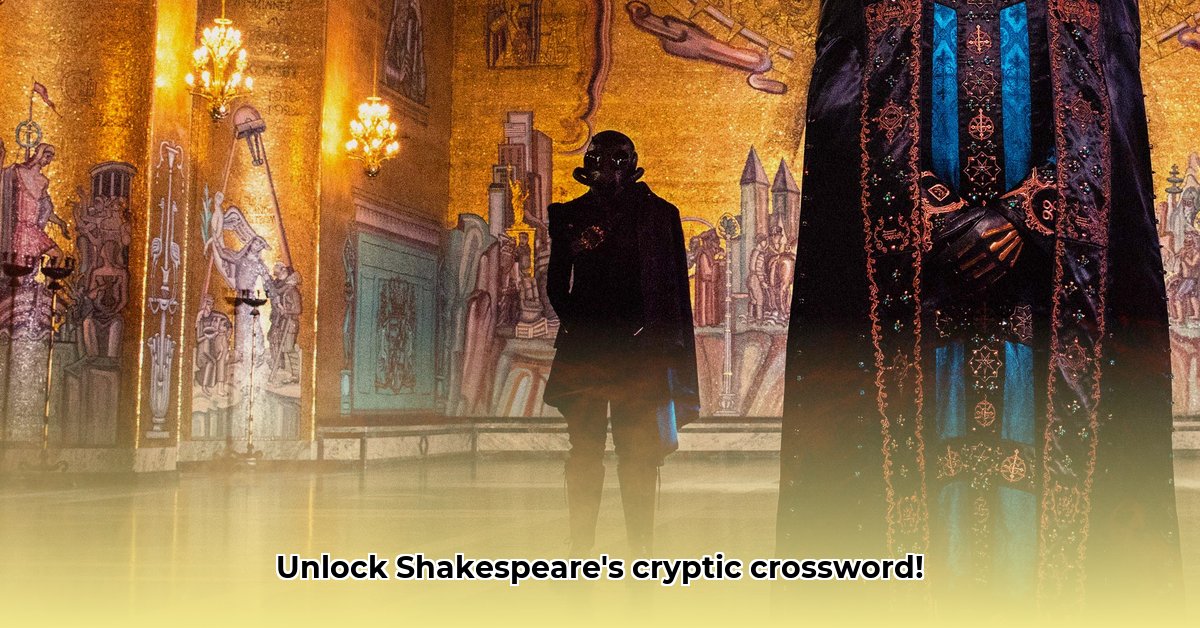Ever get stumped by a crossword clue, especially one like “Shakespearean ghost”? Don’t worry, it happens to the best of us! This guide will walk you through cracking this tricky clue, exploring various potential solutions and the reasoning behind each. Whether you’re a seasoned crossword solver or a beginner, this comprehensive guide will equip you with the knowledge to solve this and similar clues with confidence. Let’s embark on this “Shakespearean ghost” solving adventure together!
Decoding the Shakespearean Ghost Crossword Clue: Unveiling the Mystery
That blank stare when facing “Shakespearean ghost” in a crossword? You’re not alone! This seemingly straightforward clue hides multiple potential answers, making it a true test of your Shakespearean knowledge and crossword-solving skills. Let’s break down the ambiguity and explore the possibilities.
The Allure of Ambiguity: Why “Shakespearean Ghost” is a Crossword Challenge
The beauty (and the challenge!) of this clue lies in its inherent ambiguity. It’s rarely a simple question with a single, obvious answer; it’s a puzzle within a puzzle. While the ghost from Hamlet might be the first thing that springs to mind, a skilled crossword constructor might have other, more cunning options in store. This section explores why this ambiguity exists and how it contributes to the enjoyment of crossword solving.
The most crucial element to consider is the length of the answer. Is the crossword grid expecting a short word, perhaps only four letters, or a longer name or phrase? Also, consider the difficulty level of the crossword itself. Monday puzzles are generally easier than Saturday puzzles. This single detail can dramatically narrow down the possibilities and influence your approach to the clue. Finding a perfect four-letter fit, for instance, could lead you down a completely different path than searching for a ten-letter solution!
Beyond Hamlet: Expanding the Spectrum of Ghostly Suspects in Crossword Puzzles
Let’s brainstorm some less obvious but equally valid options for “Shakespearean ghost.” Consider these possibilities to spark your creative problem-solving:
- BACON: Believe it or not, this is a viable answer! This refers to the persistent theory that Francis Bacon actually penned Shakespeare’s plays. Some crossword creators consider this a perfectly acceptable, even playful, nod to this historical debate. The length of the answer space in the grid is key to determining if this is correct.
- Character Names: Given that many Shakespearean plays feature ghosts, the answer could simply be the name of one of these spectral characters. Banquo’s ghost in Macbeth, for example, is a strong contender. The required number of letters will be your guide in selecting the correct character. Consider also less obvious characters associated with ghosts, such as Marcellus or Horatio from Hamlet, who both see the ghost.
- Metaphorical Ghosts: Perhaps the clue isn’t looking for a literal ghost at all! Could it be alluding to a recurring theme or idea prevalent in Shakespeare’s works? Concepts such as “revenge,” “ambition,” or “fate” could all be considered metaphorical “ghosts” that haunt his plays. A four-letter answer might be “woes,” as in, the woes that haunt a character.
- Words Associated with Ghosts: Instead of a character or theme, think about words commonly associated with ghosts in Shakespeare’s time. For instance, “shade” or “spirit” are related terms that might fit the clue.
Mastering the Art: Step-by-Step Strategies for Solving Shakespearean Crosswords
To solve ambiguous clues like this, a strategic approach is essential:
-
Letter Count is Paramount: Always begin by determining the precise number of letters required for the answer. This instantly eliminates many possibilities, narrowing your focus.
-
Check the Crossings: Look at the letters that this answer shares with other words in the crossword. Those letters can provide valuable clues and help you confirm or reject potential answers.
-
Think Association: Try to brainstorm synonyms or related concepts. What other words evoke the idea of a “ghost”? Don’t be afraid to think outside the box and explore unconventional connections. What are the typical feelings associated with Shakespearean ghosts? The answer could be a word like “fear.”
-
Delve into Shakespeare’s World: Brush up on your Shakespearean knowledge! Familiarize yourself with different plays and the spectral characters they feature. Remember key plot points and recurring themes. A quick online search for “Shakespearean ghosts” can jog your memory.
-
Consider the Source: Is the crossword puzzle in a publication known for its literary bent, or is it a more general-interest puzzle? The sophistication of the clue might vary accordingly.
-
Embrace the Ambiguity: Keep in mind that the clue may not be seeking a direct, literal ghost. A figurative or metaphorical interpretation could hold the key to unlocking the solution.
The “Bacon” Enigma: Understanding Statistical Hints in Crosswords
Many online crossword solvers will suggest “BACON” as a potential solution to this clue. This high frequency indicates its relative popularity among crossword constructors. According to crossword enthusiasts, the prevalence of “BACON” reflects a widespread awareness of the Shakespeare authorship question, rather than necessarily being the intended answer in every instance. The wide range of potential answers underscores the clue’s inherent ambiguity. If other clues in the puzzle have a literary or wordplay theme, “Bacon” becomes a more likely answer.
Balancing Act: The Crossword Creator’s Dilemma
Crafting compelling crossword puzzles is a genuine art form. Puzzle constructors must create clues that are simultaneously solvable and engaging for solvers. Ambiguous clues, like “Shakespearean ghost,” are often employed to heighten the challenge and test the solver’s knowledge and lateral thinking abilities. This particular clue exemplifies the delicate balance between difficulty and fairness. The best constructors will provide enough context, either through the letter count or crossing answers, to make the puzzle solvable, even if the answer isn’t immediately obvious.
Conclusion: Embrace the Possibilities When Solving Crosswords
There is often no single, definitive “correct” answer to this clever clue – its very versatility is its strength. Its capacity to trigger a multitude of interesting and defensible solutions reflects the rich and multifaceted nature of Shakespeare’s works. Don’t be discouraged if your first guess is wrong. Crossword solving is a process of elimination and creative thinking. So, the next time you encounter a similarly perplexing clue, remember to relax, relish the challenge, and explore all plausible answers! After all, it’s all part of the puzzling fun.
How to Solve Ambiguous Shakespearean Ghost Crossword Clues
It’s undeniable: Shakespearean ghost clues offer more than their fair share of challenges. Presenting a range of possible solutions, they keep even the most seasoned solvers on their toes. Thankfully, a solid grasp of Shakespearean lore and crossword construction, combined with a systematic approach, can turn these puzzles into conquerable quests.
Understanding the Layers of Ambiguity in Crossword Clues
The clue “Shakespearean ghost” is, by design, intrinsically vague. It lacks specifics regarding a particular play or character, leading to its enigmatic nature. But this is precisely its charm. What are the qualifications for a “ghost” in Shakespeare? Is it a literal apparition, or is it a more figurative concept? This ambiguity sets the stage for a wide field of interpretations. This section dives deeper into the types of ambiguity that can make a clue challenging. Is it lexical ambiguity (multiple meanings of a word), syntactic ambiguity (multiple ways to interpret the sentence structure), or something else?
Unveiling Common Solutions and Their Logic in Crosswords
“HAMLETSFATHER” emerges as the most popular solution, because Hamlet’s father as a ghost shapes the entire narrative. The ghost’s demand for revenge sets the plot in motion. That said, alternate answers exist. For instance:
- MARCELLUS: As a character in Hamlet, Marcellus witnesses the ghost alongside Horatio and Bernardo. This is a less common, though still valid, solution. He’s a good answer if the letter count is shorter than “Hamlet’sFather.”
- BANQUO: In Macbeth, Banquo returns as a ghost, haunting Macbeth. This makes him a strong option if the letter count aligns. Consider also that Lady Macbeth is haunted by her guilt, which could be seen as a metaphorical ghost.
- YORICK: Although not technically a ghost, Yorick’s skull in Hamlet symbolizes mortality and time’s passage – themes often interlinked with ghosts. The larger context is key. If the answer is short, and the theme is symbolic, “skull” could work as well.
Figuring out How to Solve Ambiguous Shakespearean Ghost Crossword Clues demands a recognition of these nuances, and grasping the overall context. Thinking about the role the ghost plays in the drama is crucial.
Factors Affecting the Solution to a Complex Crossword
Various considerations play a role in deducing the “correct” solution:
- Letter Count: The allocated spaces determine the answer’s length. A four-letter answer differs markedly from a ten-letter one. Always double-check the letter count before committing to an answer. An incorrect length is the most common mistake in crossword solving.
- Clue Style: Cryptic crosswords feature wordplay unknown in standard puzzles. They may demand out-of-the-box thinking. A cryptic clue might use puns, anagrams, or other wordplay techniques to obscure the answer. Look for indicator words that
- Good Morning Images to Share with Loved Ones - January 10, 2026
- Handsome Good Morning Message for Him Long Distance to Make Him Smile - January 9, 2026
- Find the Perfect Good Morning Handsome Gif for Him - January 8, 2026










